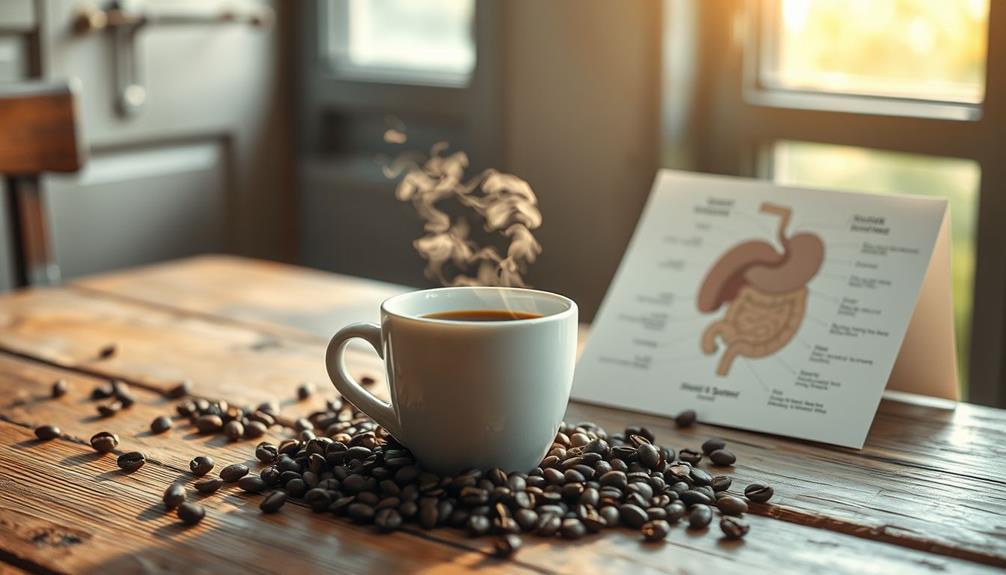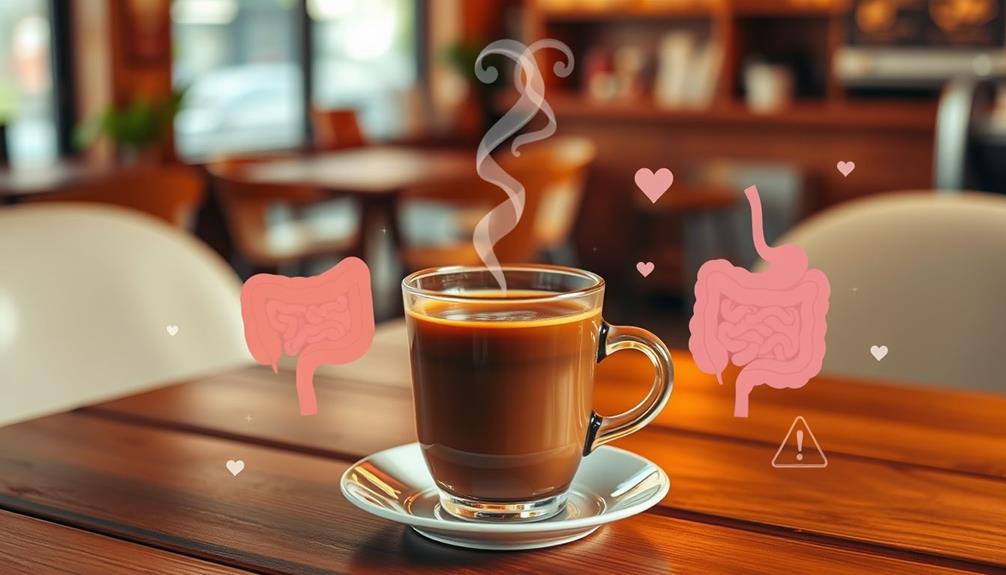Coffee Basics
How to Order Starbucks Reserve Coffee

Did you know that Starbucks Reserve Coffee offers a unique and exclusive experience for coffee lovers? With a wide range of exceptional blends and limited-time offerings, it’s a coffee connoisseur’s dream come true.
In this article, we’ll guide you through the process of ordering Starbucks Reserve Coffee, from differentiating between regular and reserve options to exploring the various brewing methods available.
Get ready to customize your order and discover the exquisite flavors that await you. Let’s dive into the world of Starbucks Reserve Coffee together.
Key Takeaways
- Regular coffee offers a familiar and consistent taste, while Reserve coffee showcases unique flavors and characteristics.
- The Starbucks Reserve menu offers a selection of exceptional coffees, each with distinct flavors and aromas.
- Different brewing methods, such as pour-over, Chemex, siphon, French press, and Clover machine, bring out different flavor profiles in Reserve coffee.
- When ordering Starbucks Reserve coffee, customers can customize their order by specifying the brewing method, cup size, type of milk, sweetness level, and flavor syrups.
Differentiate Between Starbucks Regular and Reserve Coffee
To differentiate between Starbucks regular and reserve coffee, we can examine their distinct flavor profiles and sourcing methods.

Regular coffee, which is available in most Starbucks locations, offers a familiar and consistent taste. It’s crafted using a blend of high-quality Arabica beans sourced from various regions around the world.
On the other hand, Starbucks Reserve coffee is a selection of single-origin or small-batch coffees that showcase unique flavors and characteristics. These coffees are sourced from specific farms or regions, highlighting the distinct terroir and cultivation practices.
To experience the taste of Starbucks Reserve coffee, you can visit select Starbucks Reserve stores or specialty coffee bars that offer these exclusive brews. These locations provide an elevated coffee experience, allowing you to savor the nuanced flavors and appreciate the craftsmanship behind each cup.
Familiarize Yourself With the Reserve Menu
As we delve deeper into the world of Starbucks Reserve coffee, let’s now explore the menu options available to familiarize ourselves with the enticing offerings. Understanding flavor profiles and learning about the sourcing process are essential in appreciating the unique characteristics of each coffee. The Starbucks Reserve menu showcases a selection of exceptional coffees sourced from around the world. Here is a glimpse of what you can expect:

| Coffee | Flavor Profile |
|---|---|
| Ethiopian Yirgacheffe | Floral, Citrus |
| Costa Rica Naranjo | Nutty, Chocolatey |
| Guatemala Antigua | Spicy, Earthy |
| Sumatra Gayo Mountain | Herbal, Smoky |
| Colombia Narino | Bright, Fruity |
Each coffee on the Reserve menu has been carefully curated to highlight the distinct flavors and aromas that make it special. By exploring the menu, you can embark on a journey of discovery and truly appreciate the art of coffee.
Know the Brewing Methods Available for Reserve Coffee
Once you have familiarized yourself with the Reserve menu, it’s important to know the brewing methods available for Starbucks Reserve coffee. Understanding brewing techniques allows you to appreciate the unique flavors and characteristics of each Reserve coffee.
Here are the five brewing methods you can choose from:
- Pour-over: Experience the art of handcrafted coffee with a slow, controlled pour that brings out the nuanced flavors.
- Chemex: This elegant glass brewer produces a clean, crisp cup of coffee, highlighting the origin of the Reserve beans.
- Siphon: Watch as the coffee is brewed using vacuum pressure, resulting in a smooth and rich flavor profile.
- French press: Enjoy a full-bodied and robust cup of coffee with its signature boldness.
- Clover: Witness the precision of this machine that extracts the best flavors from each Reserve coffee, ensuring a consistently exceptional cup.
Customize Your Order Based on Your Preferences
We frequently customize our order based on our preferences when ordering Starbucks Reserve coffee. Thankfully, Starbucks offers a range of customization options to ensure that each cup of Reserve coffee is tailored to our liking.

One important tip for ordering is to specify the brewing method. Whether it’s the classic French press or the pour-over method, each brewing method brings out unique flavors and characteristics of the coffee.
Additionally, we’ve the option to choose the size of our cup, the type of milk or alternative milk, and the level of sweetness or flavor syrups we prefer.
Explore the Unique Reserve Coffee Blends and Limited-Time Offerings
To continue our conversation about customizing our Starbucks Reserve coffee, let’s now dive into the exciting world of unique Reserve coffee blends and limited-time offerings.
When it comes to Starbucks Reserve, there’s always something new and intriguing to discover. Here are a few ways to explore and appreciate the art of coffee through our exceptional offerings:

- Discovering exotic coffee origins: Immerse yourself in the rich and diverse flavors of coffee from regions like Ethiopia, Colombia, and Costa Rica. Each cup tells a unique story of the land it comes from, offering a truly special experience.
- Exploring the art of coffee tasting: Savor the nuances of different brewing methods and brewing times. From pour-over to French press, each brewing technique enhances the flavors in its own distinct way, allowing you to appreciate the coffee in all its complexity.
- Embracing limited-time offerings: Don’t miss out on our exclusive Reserve coffee blends that are only available for a limited period. These rare and carefully crafted coffees are a testament to our commitment to innovation and quality.
- Engaging with knowledgeable baristas: Our passionate and skilled baristas are here to guide you on your coffee journey. They can share their expertise, recommend personalized blends, and even provide brewing tips to help you enjoy the perfect cup of Starbucks Reserve coffee.
- Supporting sustainable coffee practices: By choosing Starbucks Reserve, you’re supporting our ongoing efforts to source coffee responsibly and promote sustainable farming practices. Every sip you take contributes to a more sustainable future for coffee growers and the planet.
With these unique Reserve coffee blends and limited-time offerings, you can expand your coffee horizons and experience the finest flavors from around the world. So, come on in and let’s serve you a cup of coffee that will take you on a remarkable journey of taste and discovery.
Frequently Asked Questions
Can I Order Starbucks Reserve Coffee Online?
Yes, we can order Starbucks Reserve coffee online. The ordering process is convenient, allowing us to choose from a wide selection and have it delivered to our doorstep. The benefits of ordering online include saving time and enjoying the unique flavors of Starbucks Reserve coffee.
How Long Are Starbucks Reserve Coffee Blends Typically Available For?
Typically, Starbucks Reserve coffee blends have a limited availability duration. They are often released as limited editions, making them highly sought after by coffee enthusiasts.
Are There Any Specific Brewing Methods Recommended for Different Reserve Coffee Blends?
When it comes to brewing techniques for different reserve coffee blends, we recommend exploring various methods like pour-over or French press. Each blend has unique tasting notes, so experimenting with different brewing methods can enhance the flavor experience.

Can I Request a Specific Roast Level for My Reserve Coffee?
Yes, you can absolutely request a specific roast level for your Starbucks Reserve Coffee. We believe in catering to your custom roast preferences. Additionally, we offer alternative brewing options to enhance your coffee experience.
Are Starbucks Reserve Coffee Blends More Expensive Than Regular Starbucks Coffee Options?
Starbucks Reserve Coffee blends are worth the extra cost. Exploring the flavor profiles of Starbucks Reserve Coffee is an experience that we highly recommend. It’s a way to elevate your coffee experience and indulge in unique, high-quality blends.
Conclusion
So there you have it, a guide to ordering Starbucks Reserve coffee. Now that you know how to differentiate between regular and Reserve coffee, familiarize yourself with the Reserve menu, and customize your order based on your preferences, you can embark on a truly unique and experiential coffee journey.
Don’t miss out on the opportunity to explore the distinctive Reserve coffee blends and limited-time offerings. Indulge in the rich flavors and discover a whole new world of coffee at Starbucks Reserve.

Cheers!
Justin is a seasoned author, coffee and tea enthusiast, and an essential member of the Cappuccino Oracle team. With a keen appreciation for the complexities of coffee, coffee alternatives, and tea, Justin has dedicated his professional career to exploring these realms and sharing his insights with readers worldwide.
Justin’s immersion in the world of coffee, coffee alternatives, and tea began at a young age, kindling a passion that extended beyond mere consumption. This love for these beverages led him to combine his talent for writing with his devotion to coffee and tea, bringing him to Cappuccino Oracle as a dedicated author.
Coffee Basics
The Dark Truth About Decaf Coffee Nobody Talks About
Find out the shocking truths about decaf coffee that could change your morning routine forever. What you discover may surprise you!

Decaf coffee might seem like a safe, caffeine-free alternative, but it comes with some hidden dangers. Many decaf processes use chemical solvents like methylene chloride, which raise health concerns due to their carcinogenic nature. Additionally, some decaf options might actually contain harmful fats that could raise your cholesterol. You'd also be surprised to find that decaf isn't completely caffeine-free, with each cup holding around 2-5 mg of caffeine. Despite its rich flavor potential, the quality greatly varies. Want to uncover more intriguing facts about decaf and its production? There's plenty more that you might want to learn.
Key Takeaways
- Many decaf coffees are processed with chemical solvents like methylene chloride, raising concerns about potential carcinogenic residues.
- Early decaffeination methods used benzene, a known carcinogen, contributing to ongoing health concerns about decaf coffee.
- Some decaf options have higher fat content, which may lead to increased cholesterol levels in sensitive individuals.
- Decaf coffee isn't completely caffeine-free; it contains about 2-5 mg of caffeine per 8 oz cup, contrary to popular belief.
- The decaffeination process can strip beneficial compounds and antioxidants from coffee, affecting its overall health benefits.
Millennials and Their Decaf Preference

In recent years, millennials have emerged as the driving force behind the rising trend of decaf coffee consumption in the U.S. This shift reflects a growing preference for moderation in caffeine intake, aligning with millennials' focus on wellness and healthier lifestyle choices.
Coffee's health benefits are becoming more recognized, emphasizing the positive aspects of enjoying coffee without the caffeine jitters. You might find that many in your social circle are opting for decaf, and it's not just a fad; it's a conscious decision driven by health benefits.
High caffeine levels can lead to negative effects like drowsiness and red eyes, which you likely want to avoid. By choosing decaf, you can enjoy the rich flavors of coffee without the jitters that often accompany high caffeine consumption.
Social media plays a key role in this trend, showcasing decaf coffee as part of a balanced lifestyle and influencing younger consumers to make mindful beverage choices.
The rise of decaf among millennials indicates a shift toward more health-conscious decisions. As you navigate your daily routine, consider how your beverage choices reflect your wellness goals.
With the increasing availability of quality decaf options, you can indulge in your love for coffee while prioritizing your health.
Pros and Cons of Decaf Coffee

Decaf coffee offers a unique blend of benefits and drawbacks that can greatly impact your health and lifestyle.
On the positive side, decaffeinated coffee allows you to enjoy the rich flavors without the jitters associated with caffeine. This can lead to fewer issues with insomnia and digestive discomfort, making it a suitable option for sensitive individuals. Additionally, it's marketed as a healthier choice, appealing to health-conscious consumers. Regular consumption of decaf could also be regarded as a healthier alternative for those monitoring their caffeine intake, much like how maintenance and tips can enhance the longevity of appliances in your home.
However, there are significant downsides to evaluate. The decaffeination process can involve harmful chemicals, like methylene chloride, although safer methods such as Swiss water processing exist.
Moreover, the higher fat content in some decaf beans can potentially raise cholesterol levels, posing risks for those with heart disease.
While decaf coffee may seem like a healthier alternative, the health benefits and risks truly depend on your individual health profile and dietary habits. Overconsumption can still lead to side effects, even if you're not caffeine-sensitive.
Balancing these pros and cons is essential for making an informed choice about incorporating decaffeinated coffee into your routine.
The Dark History of Decaf

You might be surprised to learn that decaf coffee's origins are far from innocent.
Invented by Ludwig Roselius in the early 1900s, it was initially produced using harmful chemicals, raising serious health concerns.
Plus, its rise in popularity during World War II was fueled by propaganda that framed it as a safer choice, complicating its reputation even further.
Origins of Decaf Coffee
Amid a backdrop of shifting societal values and health concerns, the origins of decaf coffee trace back to the early 1900s when Ludwig Roselius sought a caffeine-free alternative. After a shipment of coffee beans soaked in seawater, he discovered a method to remove caffeine from coffee that would change the beverage's landscape.
Initially, Roselius used benzene in this decaffeination process, a choice that later raised significant health concerns due to benzene's carcinogenic properties. Notably, just as enthusiasts seek to optimize performance with Volkswagen TDI Tuning, coffee lovers have continuously pursued better methods to enhance flavor while minimizing health risks.
As the world moved through turbulent times, particularly during World War II, decaf coffee gained popularity. With Nazi propaganda promoting the avoidance of stimulants, many turned to decaf as a safer option.
However, the taste of decaf coffees often fell short of expectations, leading consumers to question their choices.
Over the years, the decaf coffee market evolved. Growing awareness of the health risks associated with chemical solvents prompted the development of safer methods to decaffeinate.
This shift reflects broader societal changes, as you see more people consciously seeking healthier options, often tied to their apprehensions about caffeine's effects on health.
Propaganda and Perception
The evolution of decaf coffee isn't just about taste and health; it's also deeply intertwined with societal beliefs and propaganda. In the early 1900s, Ludwig Roselius introduced decaffeination, linking it to emerging health concerns. His commercialization of decaf in 1906 tapped into a growing desire for safer beverage options.
However, the method he used involved benzene, a now-known carcinogen, raising questions about the safety of early decaf production. This concern parallels discussions in the medical community about the importance of understanding treatment options and their side effects, such as those seen in breast cancer treatment.
During World War II, Nazi propaganda played a significant role in shaping public perception. By promoting the avoidance of stimulants like caffeine, they inadvertently positioned decaf coffee as a safer alternative, further embedding it in societal consciousness.
This connection between health concerns and propaganda helped normalize decaf, making it more acceptable for consumers. As time passed, the perception of decaf evolved, adapting to changing attitudes toward wellness and health trends.
Despite its questionable origins, decaf coffee has carved out a significant market segment. This journey reflects not just consumer preferences but also the complex interplay between propaganda and the perception of health in society.
Understanding this history is vital as you consider your own choices about decaf coffee today.
Health Risks and Concerns
When diving into the health risks associated with decaf coffee, it's crucial to understand the dark history that shadows its production. The original method to decaffeinate coffee, developed by Ludwig Roselius in the early 1900s, used benzene, a known carcinogen. This set a concerning precedent for health risks in decaf coffee production.
Today, some methods still rely on chemical solvents like methylene chloride and ethyl acetate. While these are regulated, their potential carcinogenic properties raise alarms. In addition, just as seasonal decor can enhance your home atmosphere, the perception of decaf coffee's safety can be influenced by its production methods, often leaving consumers confused about what they're truly drinking home decor solutions.
Moreover, research shows that certain decaf coffees may increase cholesterol levels, thanks to the higher fat content in some beans used during decaffeination. This leaves you questioning the supposed benefits of decaf.
Additionally, the decaffeination process often strips away beneficial compounds and antioxidants, leading experts to debate the overall health benefits of decaf compared to regular coffee.
You mightn't realize that not all decaf coffee is created equal. Variations in decaffeination methods can markedly affect safety and health implications, leaving many consumers in the dark about what they're truly drinking.
Health Risks in Decaf Production

Decaf coffee may seem like a safer choice, but the production process can pose significant health risks. Many decaffeination methods involve chemical solvents like methylene chloride, which is a known carcinogen. While the FDA regulates its use, concerns linger about the potential health risks tied to residual solvents left in your cup.
Additionally, understanding the differences between espresso and coffee can shed light on how decaffeinated options might vary in flavor and quality. Some methods, like the direct solvent process, attempt to steam the beans to remove these chemicals, but the effectiveness of this process is still debated.
You might prefer alternatives like Swiss water processing or supercritical CO2, which are touted as safer options that affect caffeine content. However, these methods often come with higher production costs, resulting in less widespread availability.
As a consumer, it's important to be aware of how your decaf coffee is made. Choosing brands that prioritize safe and natural decaffeination methods can help mitigate the health risks associated with traditional chemical processes.
In the end, while decaf coffee might seem like a healthier option, understanding the production risks can empower you to make better choices for your well-being.
Decaffeinated Coffee Trees Explained

Coffee lovers often seek ways to enjoy their favorite beverage without the jitters, leading to an interest in decaffeinated options. You might assume that decaffeinated coffee trees are the solution, but the reality is more complicated.
While naturally caffeine-free coffee trees exist in Cameroon and Madagascar, breeding these trees for low caffeine content has proven notoriously difficult. As with managing personal finances, understanding the complexities behind product choices is vital; even the importance of monitoring credit card statements applies here, as consumers must be aware of what they're truly purchasing.
In 2004, researchers made strides by attempting to crossbreed these caffeine-free trees. Unfortunately, by 2008, the plants reverted back to their higher caffeine levels, showcasing the challenges of this endeavor.
Though some coffee species contain little to no caffeine, all coffee plants inherently produce some level of caffeine, making the quest for truly caffeine-free options elusive.
Ongoing research aims to develop better decaf options through advanced genetic studies and breeding techniques. However, as of now, no commercially viable decaffeinated coffee trees have been successfully cultivated.
This highlights the complexities in the coffee industry regarding caffeine reduction and the ongoing pursuit of better decaf alternatives. So, next time you sip that decaf, remember the challenges behind those coffee beans you enjoy.
Caffeine Content Misconceptions

Although many people think decaffeinated coffee is completely caffeine-free, that's a common misconception. In reality, decaf coffee contains about 2-5 mg of caffeine per 8 oz cup, while regular coffee has around 95 mg for the same serving size. Some decaf varieties can even contain up to 10-15 mg of caffeine, depending on factors like the brewing method and the type of coffee bean used.
Additionally, like many natural beverages, decaf coffee can have potential interactions with certain medications, so it's important to take into account your overall health when consuming it potential side effects.
The decaffeination process doesn't completely remove caffeine, which is why these misconceptions persist. You might find that the caffeine content in decaf varies considerably due to grind size, brewing duration, and water temperature.
So, if you're sensitive to caffeine, it's worth noting that even these trace amounts can still produce mild effects in some individuals.
Understanding the caffeine content in decaf can help you make better choices about your coffee consumption. While it's a great option for those looking to cut back on caffeine, it's crucial to recognize that decaf isn't entirely devoid of it.
Stay informed, and you can enjoy your decaf coffee without any surprises!
Taste and Quality of Decaf

When you think of decaf coffee, you might picture a weak flavor, but that's often due to the quality of the beans used.
Choosing higher-grade arabica beans can lead to a richer taste experience, just like Peet's decaf offerings.
Additionally, the health benefits of Americano coffee can serve as a comparison, as the quality of the coffee markedly influences both taste and nutritional value.
Plus, the method of decaffeination plays a big role, with some processes preserving flavor better than others.
Quality of Coffee Beans
For those who think decaf coffee lacks flavor, it's time to reconsider. The quality of coffee beans plays a significant role in determining the taste of your decaf. High-quality arabica beans typically yield a richer flavor profile, making your decaf experience far more satisfying than you might expect.
In fact, various brewing methods can also enhance the flavor of decaf, allowing for a more enjoyable cup. Take Peet's decaf coffee, for instance; it's known for using superior beans that mirror the flavor profile of its regular blends, proving that decaf can be just as enjoyable.
Moreover, decaf coffee made from specialty-grade beans, like Decaf Columbia Excelso, benefits from meticulous processing methods. Techniques such as the Swiss Water Process help preserve the coffee's taste while effectively removing caffeine.
This careful attention to sourcing and processing means that well-crafted decaf can deliver a taste experience that rivals traditional caffeinated options.
Flavor Perception Challenges
Decaf coffee often faces an uphill battle in flavor perception, primarily due to misconceptions about its taste and quality. Many people believe decaf lacks the robust flavor profile found in regular coffee, similar to how some perceive ice cream quality as inconsistent.
However, this perception often stems from the quality of the beans used. When high-quality arabica beans are selected, as seen in Peet's decaf, the flavor can be just as rich and satisfying as its caffeinated counterparts.
You might notice a stark difference when comparing mass-produced decaf with specialty options. Craft roasters carefully source their beans and focus on roasting techniques that enhance flavor, resulting in a much more enjoyable cup.
Taste comparisons reveal that Peet's decaf often outshines other roasters, emphasizing the importance of bean selection.
Moreover, the decaffeination process, particularly methods like the Swiss Water Process, can greatly impact the flavor complexity of decaf coffee. If handled with care, this method minimizes the negative effects on the beans' natural qualities.
In short, if you're willing to explore high-quality decaf options, you might just discover that the flavor is anything but weak.
Decaffeination Process Uncovered

In the world of coffee, understanding the decaffeination process is essential for those seeking a caffeine-free experience. This process primarily takes place on green coffee beans before they're roasted.
There are several methods to extract caffeine from coffee beans, including water processing, chemical solvents, and carbon dioxide extraction.
Common solvents like ethyl acetate and methylene chloride are used in chemical decaffeination, although it's worth noting that methylene chloride is a regulated carcinogen.
For a healthier alternative, consider the Swiss Water Process. This chemical-free method removes up to 99.9% of caffeine, relying solely on water and charcoal filters, making it a favorite among health-conscious consumers.
After the decaffeination process, your decaf coffee will typically still contain about 2-5 mg of caffeine per 8 oz cup—a much lower amount than the 95 mg found in regular coffee.
The quality and flavor of decaf can vary considerably based on the decaffeination method and the beans' quality. Specialty roasters often provide better-tasting options, ensuring that your caffeine-free experience is still enjoyable.
Common Misunderstandings About Decaf

Understanding the decaffeination process can help clarify some common misunderstandings about decaf coffee.
First off, many folks think decaf is completely caffeine-free, but that's not true. Each cup usually contains about 2-5 mg of caffeine compared to 95 mg in regular coffee. So, if you're sensitive to caffeine, you'll want to keep that in mind.
Another misconception is that decaf lacks health benefits. In reality, decaf retains antioxidants and can provide similar protective effects against certain diseases as regular coffee.
You might also assume that decaf coffee tastes weaker, but high-quality decaf brands can deliver a robust taste that rivals their caffeinated counterparts.
Additionally, not all decaf is created equal. The processes used can vary considerably; some use chemical solvents while others rely on water or CO2 methods.
Finally, many people think decaf is only for those avoiding caffeine, but it's increasingly popular among coffee lovers who enjoy the flavor without the jitters or insomnia.
Frequently Asked Questions
Is There Anything Unhealthy About Decaf Coffee?
Yes, decaf coffee can have health concerns. It may contain chemicals from the decaffeination process, higher fat content, and potentially fewer antioxidants. If you're sensitive, it might also cause digestive issues or acid reflux.
What Was the Point of Decaf Coffee?
Decaf coffee offers a guilt-free pleasure, allows you to enjoy the flavor, and lets you savor the ritual. It's designed for those who crave the comforting experience of coffee without the jitters or sleepless nights.
Which Decaf Coffees Use Methylene Chloride?
You might find that many commercial decaf coffees use methylene chloride in their decaffeination process. It's essential to check labels or ask roasters about their methods if you're concerned about chemical solvents in your coffee.
Is Decaf Coffee Ok for Your Heart?
Decaf coffee can be okay for your heart, but it varies by individual. You should consider your health profile and consult your doctor, especially if you have concerns about cholesterol or caffeine sensitivity.
Conclusion
So, the next time you sip on that decaf, remember there's more beneath the surface. While it offers a caffeine-free experience, understanding its history and production can enhance your appreciation. It's not just about avoiding jitters; it's about knowing what's in your cup. By diving deeper into decaf's complexities, you can truly enjoy your coffee moments—savoring the flavor and the journey it took to get to you. Embrace the dark truth and celebrate your brew!
In the vast and diverse world of coffee, coffee alternatives, and tea, Olivia has found her calling. As an author and a dedicated coffee and tea aficionado, her work for Cappuccino Oracle reflects her profound love and understanding of the intricate complexities found within these beverages. Olivia’s passion for the subject serves as both a catalyst for her creativity and a connection point with her audience.
Olivia’s appreciation for coffee, coffee alternatives, and tea blossomed at an early age. She discovered that these beverages invigorated her senses and stimulated her creative spirit. From the nuanced flavors of single-origin roasts to the captivating narratives intertwined with coffee, coffee alternatives, and tea trade and culture, Olivia found an unlimited source of inspiration in her daily cup.
Her love for these beverages and her talent for storytelling eventually converged at Cappuccino Oracle. As an author, Olivia’s mission is to illuminate the intricate tapestry that makes up the world of coffee, coffee alternatives, and tea. Her articles span a diverse range of topics, encompassing everything from the unique flavors of different brews to the sociocultural history intertwined with their cultivation and consumption.
Coffee Basics
Coffee and Intermittent Fasting: What You Need to Know
Not only can coffee enhance your intermittent fasting experience, but it also offers surprising benefits that you won’t want to miss discovering!

If you're into intermittent fasting, black coffee can be your best friend. It's nearly calorie-free, so it won't break your fast, and it helps boost your metabolism while promoting fat oxidation. Drinking 1-2 cups can also increase alertness and improve mood, thanks to its caffeine content. Just remember to skip the milk and sugar, as additives can mess with your fasting benefits. Moderation is key—stick to about four cups a day to avoid any jitters. Want to discover more about integrating coffee into your fasting routine? There's plenty more to explore!
Key Takeaways
- Black coffee is ideal for intermittent fasting as it is nearly calorie-free and won't break your fast.
- Consuming 1-2 cups of black coffee can boost metabolism and enhance fat oxidation during fasting.
- Additives like milk or sugar should be avoided to maintain the fasting benefits of black coffee.
- Regular coffee consumption is linked to improved cognitive function, mood, and lower risks of chronic diseases.
- Moderation is key; excessive caffeine intake can lead to negative health effects and disrupt sleep patterns.
Understanding Intermittent Fasting

Understanding intermittent fasting can be a game-changer for your eating habits. This eating pattern alternates between fasting periods and eating, focusing more on when you eat rather than what you consume. You might find methods like time-restricted eating useful, such as the popular 16/8 method, where you fast for 16 hours and eat during an 8-hour window.
Incorporating health benefits of coffee during your eating periods may enhance your overall experience. During your fasting periods, you can only consume low-calorie beverages like water, black coffee, or tea. This restriction helps your body enter a state that can promote weight loss and improve insulin sensitivity.
Many people experience notable health benefits from intermittent fasting, including reduced risks of chronic diseases like heart disease and type 2 diabetes.
The flexibility of intermittent fasting allows you to tailor your approach to fit your lifestyle and preferences. Whether you choose alternate-day fasting or stick to a time-restricted eating plan, you can adapt it to meet your needs.
With so many options available, you can embrace intermittent fasting as a versatile and effective strategy for enhancing your overall health.
Coffee Consumption During Fasting

During intermittent fasting, coffee can be a valuable ally. Black coffee is nearly calorie-free, making it an ideal beverage that won't break your fast. With numerous varieties available, including single-origin and blends, you can explore different flavors while enjoying your coffee.
When you drink 1-2 cups of black coffee, you can enhance your metabolic rate and promote fat oxidation while enjoying appetite suppression, which helps you stick to your fasting schedule. Coffee varieties can excite your taste buds and provide a satisfying experience.
It's essential to avoid high-calorie additives like milk or sugar, as they can disrupt the benefits of fasting. Sticking to black coffee or using minimal low-calorie options is the way to go.
Regular coffee consumption during fasting not only keeps you energized but also offers health benefits, such as improved brain function and reduced inflammation.
Caffeine, present in coffee, is generally safe in moderation—up to 400 mg per day, or about four cups, is acceptable for most individuals.
Health Benefits of Coffee

When you enjoy your daily cup of coffee, you're not just savoring its rich flavor; you're also boosting your cognitive function and overall health.
Coffee can evoke feelings of joy and nostalgia, much like a heartwarming song, and with its powerful antioxidants, it helps protect your body against diseases while reducing inflammation.
Plus, regular consumption is linked to a lower risk of conditions like heart disease and Type 2 diabetes, making it a smart choice for your well-being.
For those looking for a radiant start to their day, coffee can be as uplifting as Blue Skies and Lemonade, making it an ideal companion for your health journey.
Cognitive Function Enhancement
Coffee's remarkable ability to enhance cognitive function has made it a favorite among many seeking a mental boost. The caffeine in coffee blocks adenosine, a neurotransmitter that promotes sleep, which increases your alertness and focus. As a result, you might find that your memory and learning capabilities improve considerably. Regular coffee drinkers often report better information retention and recall, which can be particularly beneficial during fasting periods when mental clarity is essential.
Research shows that a daily intake of 3-5 cups of coffee may lower the risk of neurodegenerative diseases like Alzheimer's and Parkinson's. This protective effect against cognitive decline suggests that coffee can be part of a healthy lifestyle aimed at maintaining brain health as you age.
| Benefit | Details |
|---|---|
| Enhanced Cognitive Function | Caffeine boosts alertness and improves focus. |
| Improved Memory | Regular consumption helps with information retention. |
| Reduced Disease Risk | May lower the risk of neurodegenerative diseases. |
Incorporating coffee into your daily routine might just give you the edge you need for ideal cognitive performance.
Antioxidant Properties Benefits
Many people don't realize that coffee is a powerhouse of antioxidants, which can considerably benefit your health. These antioxidants help neutralize free radicals, reducing oxidative stress in your body and potentially lowering the risk of chronic diseases.
Regular coffee consumption can be particularly advantageous for several reasons, and like cranberry juice, it may also provide protective effects against certain health issues, according to studies on antioxidant consumption.
- It may decrease the risk of Type 2 diabetes.
- It's linked to a lower risk of heart disease.
- It supports liver health, with coffee drinkers showing improved liver enzyme levels.
- Antioxidants in coffee can enhance cognitive function.
- There's evidence suggesting a reduced risk of neurodegenerative diseases like Alzheimer's and Parkinson's.
The antioxidants in coffee, such as chlorogenic acid and caffeic acid, boast anti-inflammatory properties, contributing to your overall health.
By incorporating coffee into your routine, you're not only enjoying a delicious beverage but also bolstering your defenses against oxidative stress and its associated risks.
Disease Risk Reduction
Numerous studies reveal that regular coffee consumption can considerably reduce your risk of various diseases. By incorporating coffee into your daily routine, you might enjoy protective health benefits while also benefiting from the health benefits of fasting. Research shows that moderate coffee intake—up to three cups daily—can lower your risk of heart disease mortality by 19%.
Moreover, higher coffee consumption is associated with a decreased likelihood of developing Type 2 diabetes, suggesting that coffee drinkers experience a lower incidence of this condition. The rich antioxidants found in coffee help combat oxidative stress and inflammation, which may contribute to reducing disease risk.
Additionally, drinking coffee has been linked to a reduced risk of neurodegenerative diseases, such as Alzheimer's and Parkinson's, promoting better cognitive health. It also offers protective health benefits against liver diseases, including liver cirrhosis.
Here's a quick overview of coffee's health benefits:
| Disease/Condition | Coffee's Impact | Benefit Type |
|---|---|---|
| Heart Disease | 19% reduced mortality risk | Protective Health |
| Type 2 Diabetes | Lower incidence | Protective Health |
| Neurodegenerative Diseases | Decreased risk | Cognitive Protection |
| Liver Diseases | Reduced risk | Protective Health |
| Oxidative Stress | Antioxidant-rich | Overall Health Benefits |
Effects of Additives in Coffee

When you add ingredients like milk, cream, or sugar to your coffee, you might be sabotaging your fasting efforts.
Even a small amount can disrupt the calorie restrictions that help you reap the benefits of intermittent fasting.
Additionally, understanding your budget for food and drink can aid in making healthier choices during fasting periods.
To stay on track with your goals, it's crucial to monitor and limit these additives carefully.
Caloric Impact of Additives
The caloric impact of additives in coffee can be surprising, especially if you're trying to maintain a fasting regimen. High-calorie additives like milk and sugar can greatly increase the caloric content of your coffee, potentially disrupting the fasting process.
Even small amounts can affect your insulin levels, so it's vital to keep your coffee black during fasting periods. Additionally, being mindful of your environment can enhance overall wellness, similar to how ensuring proper airflow around an air purifier improves its performance air purifier maintenance tips.
Here are some key points to take into account:
- High-calorie additives (like milk or sugar) can break a fast.
- Popular drinks (such as lattes and flavored coffees) often contain excessive calories.
- Minimal amounts (like 1 teaspoon of heavy cream) may not greatly affect fasting but aren't ideal.
- Zero-calorie beverages are the best choice for maintaining fasting integrity.
- Monitoring additives in coffee is essential for your fasting goals.
To optimize your intermittent fasting experience, stick to black coffee. This way, you won't unintentionally consume calories that could disrupt your fasting process.
Fasting Benefits Preservation
Maintaining the benefits of intermittent fasting hinges on more than just meal timing; it also involves what you consume during fasting periods. When you opt for black coffee, you keep your caloric intake to a minimum—around 3 calories per 240 ml. This choice supports fasting benefits because it doesn't trigger notable metabolic changes that could disrupt your fasting state.
Additionally, consider the impact of essential oils for enhancing your overall well-being during fasting, such as essential oils for respiratory health that can help alleviate discomfort.
However, be cautious with additives. High-calorie options like milk and sugar can considerably increase your caloric intake, potentially breaking your fast. Even a small amount can counteract your fasting efforts. Low-calorie options, such as a teaspoon of heavy cream, are less impactful but should still be used sparingly to maintain fasting integrity.
It's vital to avoid flavored coffee drinks during your fasting periods, as they're typically high in calories and sugar. Monitoring and limiting additives is key to preserving the fasting benefits you seek.
Caffeine Considerations

Here are key points to keep in mind:
– Moderation is essential: Aim for up to 400 mg of caffeine daily to avoid side effects.
Additionally, consider the impact of caffeine on cold medications, as it may interact with certain drugs.
- Watch for side effects: Excessive caffeine can lead to heart palpitations and increased blood pressure.
- Monitor your insulin sensitivity: High caffeine intake might raise fasting insulin levels, so balance is vital.
- Be mindful of sleep patterns: Consuming caffeine late in the day can disrupt your sleep, affecting your overall health and fasting benefits.
- Understand individual responses: Everyone's tolerance differs; adjust your caffeine consumption based on how your body reacts.
Enhancing Fasting Benefits

Incorporating black coffee into your intermittent fasting routine can greatly amplify its benefits. During your fasting period, black coffee can enhance fat oxidation, potentially increasing your metabolic rate, which aids in weight loss efforts. The caffeine in coffee is known for its role in appetite suppression, making it easier for you to adhere to your fasting protocols. This is similar to how energy-saving features in heat pumps help optimize efficiency while reducing consumption.
While scientific evidence on appetite suppression is limited, many people find that a cup of black coffee helps curb cravings.
Moreover, regular coffee consumption is linked to reduced inflammation, complementing the benefits of intermittent fasting and promoting overall health. You may also experience improved cognitive function and mood during fasting periods, as coffee can provide the mental clarity and focus needed to stick to your fasting goals.
Additionally, black coffee is rich in antioxidants, which can further enhance the health benefits of intermittent fasting. These antioxidants not only contribute to improved longevity but also help in reducing the risk of chronic diseases.
Risks and Precautions

Maneuvering the landscape of intermittent fasting requires awareness of the risks and precautions associated with coffee consumption. While caffeine can offer benefits, such as improving focus and energy, excessive intake can lead to unwanted side effects that may hinder your fasting success and overall well-being.
Here are some key points to keep in mind:
- Moderation is essential: Too much caffeine can cause heart palpitations and increased blood pressure.
- Monitor personal tolerance: Individual responses to caffeine vary, so pay attention to how it affects you. For instance, those who practice yoga might find that certain techniques help mitigate anxiety caused by caffeine.
- Consult healthcare professionals: If you have health conditions like anxiety or heart issues, check with your doctor before drinking coffee during fasting.
- Be mindful of sleep: Consuming caffeine later in the day may disrupt your sleep patterns, affecting your fasting adherence.
- Watch for adjustment symptoms: Newcomers to intermittent fasting might face fatigue or headaches, which can worsen with high caffeine intake.
Personalized Approaches to Fasting

Understanding the risks and precautions of coffee consumption during intermittent fasting sets the stage for adopting a personalized approach to your fasting routine.
Intermittent fasting isn't one-size-fits-all, and you might find various schedules like 16/8, 18/6, or 5:2 more suitable for your lifestyle and goals. Your individual responses to fasting can be influenced by factors like age, gender, and metabolic health.
For instance, women often experience different metabolic responses due to hormonal fluctuations, making it essential to tailor your fasting plan according to your menstrual cycle. Gradually introducing fasting periods can help you assess your tolerance and adjust your eating patterns comfortably.
Don't hesitate to consult healthcare professionals for personalized fasting advice, especially if you have underlying health conditions or are considering significant dietary changes.
Frequently Asked Questions
What Is the Rule for Coffee During Intermittent Fasting?
When you're intermittent fasting, you can enjoy black coffee without worrying about calories. Just skip any high-calorie additives like milk or sugar, as they can break your fast and hinder your goals.
What Can I Put in My Coffee That Won't Break My Fast?
You can add zero-calorie sweeteners, like stevia, or spices such as cinnamon to your coffee without breaking your fast. Just avoid high-calorie ingredients like milk, cream, or sugar to maintain your fasting benefits.
Why Is 16 Hours the Magic Number for Fasting?
The 16-hour fasting window's ideal because it aligns with your body's natural rhythms, enhances fat burning, promotes cellular repair, and improves metabolic health. This balance helps you achieve better overall health and weight management.
What Happens if You Only Drink Coffee and Don't Eat?
If you sip only coffee, you're dancing on a razor's edge. You might lose weight at first, but fatigue and irritability could soon crash the party, leaving you nutrient-depleted and craving balance.
Conclusion
In the journey of intermittent fasting, think of coffee as your trusty compass. It can guide you through those long fasting hours, keeping your energy up and cravings at bay. Just like a sailor relies on their compass to navigate stormy seas, you can rely on coffee to enhance your fasting experience. But remember, it's important to listen to your body and adjust as needed. With the right balance, you'll find your way to better health and well-being.
In the vast and diverse world of coffee, coffee alternatives, and tea, Olivia has found her calling. As an author and a dedicated coffee and tea aficionado, her work for Cappuccino Oracle reflects her profound love and understanding of the intricate complexities found within these beverages. Olivia’s passion for the subject serves as both a catalyst for her creativity and a connection point with her audience.
Olivia’s appreciation for coffee, coffee alternatives, and tea blossomed at an early age. She discovered that these beverages invigorated her senses and stimulated her creative spirit. From the nuanced flavors of single-origin roasts to the captivating narratives intertwined with coffee, coffee alternatives, and tea trade and culture, Olivia found an unlimited source of inspiration in her daily cup.
Her love for these beverages and her talent for storytelling eventually converged at Cappuccino Oracle. As an author, Olivia’s mission is to illuminate the intricate tapestry that makes up the world of coffee, coffee alternatives, and tea. Her articles span a diverse range of topics, encompassing everything from the unique flavors of different brews to the sociocultural history intertwined with their cultivation and consumption.
Coffee Basics
The Gut-Coffee Connection: How Your Daily Cup Affects Digestive Health
Find out how your daily cup of coffee impacts your digestive health and discover surprising effects that could change your morning routine forever.

Your daily cup of coffee can greatly affect your digestive health. It stimulates gastric acid production, which helps digest food but might irritate sensitive stomachs. Drinking moderate amounts—around 1 to 3 cups daily—can enhance gut motility and even promote the growth of beneficial bacteria like Bifidobacteria. However, if you have conditions such as IBS or GERD, coffee might exacerbate your symptoms. Choosing low-acid or dark roasts can lessen discomfort. Staying hydrated and pairing coffee with high-fiber foods can support digestion too. There's much more to discover about how coffee interacts with your gut health.
Key Takeaways
- Moderate coffee consumption can stimulate gastric acid secretion, aiding digestion and improving bowel motility for many individuals.
- Antioxidants in coffee, particularly chlorogenic acids, promote gut health by reducing inflammation and improving digestive efficiency.
- Regular coffee intake enhances the growth of beneficial bacteria like Bifidobacteria, supporting a diverse gut microbiota and aiding nutrient absorption.
- Coffee may exacerbate symptoms for individuals with conditions like IBS or GERD, leading to digestive discomfort.
- Staying hydrated and consuming high-fiber foods alongside coffee can optimize its digestive health benefits while minimizing potential side effects.
Historical Significance of Coffee

The historical significance of coffee stretches back to the 15th century when an Ethiopian goat herder first noticed its energizing effects on his goats. This discovery marked the beginning of a beverage that would evolve into a cultural staple across various societies.
Coffee comes from the harvested berries of Coffea plants, which undergo processing methods like wet or dry processing before they're roasted and ground into your daily cup. Over time, various brewing methods, such as the French press and espresso, have emerged, each contributing to the unique experience of enjoying coffee and its varied caffeine levels.
In many cultures, coffee was more than just a drink; it played a crucial role in social interactions and rituals. Monks used coffee to stay awake during long prayer sessions, highlighting its function in enhancing alertness and focus.
Yet, coffee's stimulating properties rendered it a controversial drink in some regions, leading to temporary bans. Despite this, it found its way into the hearts (and hands) of many, becoming an integral part of daily life.
With its rich history, coffee has transcended its origins, influencing societies and cultures worldwide. Its journey from Ethiopian goats to global coffeehouses showcases not only its energizing effects but also its enduring place in human connection.
Coffee's Effects on Digestion

Coffee can have a significant impact on your digestion, both positively and negatively. Regular coffee consumption stimulates gastric acid secretion, which can aid digestion but might also cause discomfort like heartburn or diarrhea, especially in sensitive individuals.
Coffee varieties and preparation techniques can influence how your body reacts to caffeine. If you enjoy moderate consumption of up to three cups daily, you may experience improved bowel motility and relief from constipation. However, the acidity in coffee can irritate your stomach lining and exacerbate gastrointestinal disorders like gastroesophageal reflux disease (GERD) and gastritis.
Choosing dark roasted coffee can be beneficial, as it typically has lower acidity compared to lighter roasts, potentially reducing digestive discomfort. This choice can help you enjoy your favorite beverage without triggering heartburn.
Additionally, research indicates that regular coffee drinkers may experience positive changes in gut microbiota composition, promoting the growth of beneficial bacteria. This shift can enhance your overall digestive health, making coffee a double-edged sword.
While it can offer benefits, it's crucial to listen to your body and adjust your intake accordingly to avoid any adverse effects.
Benefits for Gut Health

When you enjoy your daily cup of coffee, you're not just savoring a rich flavor; you're also reaping benefits for your gut health.
Coffee's antioxidant properties can help reduce inflammation, while its ability to enhance gut motility can keep things moving smoothly.
Additionally, coffee may interact positively with other beverages, such as cranberry juice consumption, promoting overall digestive health.
Plus, regular consumption promotes the growth of beneficial bacteria, supporting a balanced microbiome.
Antioxidant Properties of Coffee
How does coffee, often celebrated for its rich flavor, also serve as a powerhouse of antioxidants that can benefit your gut health? Coffee is packed with antioxidants, particularly chlorogenic acids, which can greatly reduce oxidative stress and inflammation in your gastrointestinal tract.
This reduction in inflammation helps promote overall gut health, allowing your digestive system to function more efficiently. Additionally, essential oils for digestive support can complement coffee's benefits by promoting a healthy digestive environment.
Regular coffee consumption has been linked to an increase in beneficial bacteria, such as Bifidobacteria, which enhances microbiome diversity. A diverse microbiome is essential for peak digestive health, as it supports the balance of good bacteria in your gut.
Studies suggest that enjoying about 3.5 cups of coffee daily might even correlate with a 15% lower risk of death from all causes, partly due to its antioxidant properties that support gut health.
Additionally, the antioxidants in coffee may assist in recovery following gastrointestinal surgeries, further showcasing their role in improving digestive health.
Enhanced Gut Motility
A warm cup of coffee can do wonders for your gut motility, stimulating your intestines and helping alleviate constipation. Research shows that coffee consumption is linked to enhanced gastrointestinal activity, making it a great choice for those seeking constipation relief. The caffeine content plays a significant role in promoting bowel frequency, often leading to quicker waste elimination compared to just drinking water.
Here's a quick look at how coffee supports your digestive health:
| Aspect | Impact |
|---|---|
| Coffee Consumption | Increases gut motility |
| Caffeine Content | Boosts gastrointestinal activity |
| Antioxidants | Supports a healthy gut microbiome |
| Improved Bowel Function | Enhances recovery post-surgery |
Regular coffee drinkers often report improved bowel function, and studies suggest that moderate intake can lead to better gastrointestinal recovery. Plus, the antioxidants in coffee contribute to a healthier gut microbiome, further promoting digestive health. So, next time you reach for your cup, remember that your gut will likely thank you!
Beneficial Bacteria Growth
Coffee can really boost the growth of beneficial bacteria in your gut, playing an essential role in maintaining digestive health. Studies show that regular coffee consumption increases the levels of Bifidobacteria, a type of beneficial bacteria important for gut health. The chlorogenic acids in coffee actively promote the growth of these beneficial microbes while inhibiting harmful bacteria, enhancing your microbiome's overall balance.
In addition, incorporating natural remedies alongside your coffee intake can additionally support your digestive health. Moderate coffee intake also supports gastrointestinal recovery, helping your gut heal after surgery or illness. This recovery is essential for restoring function and ensuring your digestive system operates effectively.
Moreover, coffee drinkers tend to enjoy a more diverse gut microbiota, linked to better overall health outcomes and improved nutrient absorption.
One of the standout benefits of coffee is its anti-inflammatory properties, which help reduce gut inflammation. This creates a favorable environment for beneficial bacteria to thrive, making your gut healthier and more resilient.
Potential Risks and Side Effects

While coffee can offer some gut benefits, it's important to be aware of the potential risks it poses.
Individuals with conditions like Borderline Personality Disorder (BPD) may experience heightened emotional responses, which can further complicate their digestive health when consuming caffeinated beverages.
If you have conditions like irritable bowel syndrome or gastroesophageal reflux, coffee might worsen your symptoms.
Additionally, concerns about mycotoxin sensitivity could add another layer of complexity to your coffee consumption.
Irritable Bowel Syndrome Exacerbation
Exacerbation of Irritable Bowel Syndrome (IBS) can be a frustrating experience, especially when dietary choices come into play. If you're a coffee drinker, it's important to understand how coffee consumption might impact your symptoms.
The caffeine content in coffee can stimulate intestinal motility, potentially leading to loose stools or diarrhea, which are common issues for those with IBS. This can cause significant gastrointestinal discomfort and digestive disturbances that you'd rather avoid.
Additionally, ensuring a clean environment with ideal air quality can also contribute positively to your overall digestive health, as air purifiers can enhance indoor air quality.
Research shows that a substantial percentage of individuals with Inflammatory Bowel Disease (IBD) consume coffee, yet many report adverse effects. If you have IBS, be aware that coffee might alter your gut microbiota composition, further complicating your digestive health.
Monitoring your coffee intake is essential. Excessive consumption can exacerbate your symptoms, making it necessary to make personalized dietary choices tailored to your needs.
Heartburn and Gastroesophageal Reflux
For many people, enjoying a cup of coffee can quickly turn into a battle with heartburn and gastroesophageal reflux disease (GERD). Coffee consumption has been linked to increased gastric acid production, which may exacerbate symptoms of GERD in sensitive individuals. As a coffee drinker, you might experience symptoms like:
| Symptoms of GERD | Potential Causes |
|---|---|
| Heartburn | Increased gastric acid |
| Regurgitation | Stomach irritation |
| Dyspepsia | Coffee consumption |
While a 2014 meta-analysis showed no significant link between coffee and GERD, individual responses can vary greatly. Some studies suggest that coffee may worsen gastrointestinal discomfort, particularly for those with pre-existing conditions. If you have gastritis or other sensitive gastric issues, coffee might irritate your stomach lining, leading to uncomfortable symptoms.
It's vital to listen to your body. If you notice that your daily cup triggers heartburn or other GERD symptoms, consider adjusting your coffee consumption. Balancing your love for coffee with your digestive health is essential for long-term comfort.
Mycotoxin Sensitivity Concerns
Mycotoxin sensitivity can pose significant risks for coffee lovers, especially for those with a heightened reaction to mold. Mycotoxins are toxic compounds produced by certain molds that can contaminate coffee, potentially causing gastrointestinal discomfort.
While studies indicate harmful levels are rarely found in commercially available coffee, individuals sensitive to these toxins may still experience adverse effects when consuming varieties that haven't undergone mycotoxin testing. To support your investment in health, consider looking into brands with strong reputations for quality and safety, similar to the trusted reputation in the financial services sector found in the Gold IRA market.
To protect your digestive health, consider making informed dietary choices. Opting for organic coffee can help reduce exposure to mycotoxins, as these products often adhere to stricter regulations regarding mold contamination.
Additionally, selecting brands that conduct mycotoxin testing guarantees you're drinking coffee that's safer for your unique sensitivity.
It's essential to acknowledge that some coffee drinkers report gastrointestinal symptoms related to mycotoxin sensitivity, underscoring the importance of consumer safety.
If you're prone to discomfort after your daily cup, it may be wise to evaluate your coffee selection carefully. By prioritizing organic options and brands committed to testing, you can enjoy your coffee while minimizing potential risks associated with mycotoxins.
The Role of Mycotoxins

The presence of mycotoxins in coffee raises important questions about food safety and individual health. Mycotoxins are toxic compounds produced by certain molds that can sometimes be found in food products, including coffee.
While current studies suggest that harmful levels of mycotoxins aren't typically present in coffee consumption, those with mold sensitivity might experience gastrointestinal symptoms and digestive issues after drinking coffee.
Additionally, understanding the concept of diversification can be vital for individuals choosing various foods, including coffee, to mitigate health risks. To mitigate potential risks, it's important to promote consumer awareness regarding mycotoxin exposure. Choosing organic coffee from brands that conduct thorough mycotoxin testing can help guarantee safer options. Regulatory limits exist for mycotoxin levels in food, underscoring the significance of monitoring these compounds to maintain food safety.
Although many enjoy the health benefits of coffee, understanding the role of mycotoxins is essential, especially for individuals sensitive to molds. Anecdotal evidence indicates that some may struggle with digestive issues linked to mycotoxin presence.
Consequently, as you enjoy your daily cup, staying informed about mycotoxin risks can empower you to make better choices for your digestive health.
Research Insights on Coffee

Research into coffee's effects on digestive health reveals a complex relationship that can benefit or challenge individuals depending on their unique sensitivities.
Moderate coffee consumption, typically defined as 2.5 to 3.5 cups daily, is associated with increased gastrointestinal recovery and improved bowel motility, especially for those dealing with constipation. This intake can also boost levels of beneficial bacteria, such as Bifidobacteria, which are vital for gut health. Additionally, incorporating a balanced diet can further enhance digestive wellness and support overall health.
However, if you have conditions like irritable bowel syndrome (IBS) or GERD, you might experience exacerbated symptoms with coffee consumption. While some studies indicate that caffeine can trigger gastrointestinal discomfort, meta-analyses show no significant link between coffee intake and an increased risk of gastrointestinal diseases.
Ongoing research explores how coffee components interact with gut microbiota, highlighting the significance of understanding the long-term effects on digestive health.
As you consider your coffee habits, it's important to recognize that individual responses can vary. Balancing the benefits of coffee with your personal sensitivities can help you make informed choices about your daily cup.
Tips for Healthy Consumption

When it comes to enjoying coffee without compromising your digestive health, moderation is key. Aim for moderate levels of coffee consumption, ideally between 1 to 3 cups per day. This helps prevent digestive discomfort, especially if you have gastrointestinal issues.
Choosing dark roast coffee can also be beneficial; it typically has lower acidity and higher levels of N-methylpyridinium, which may reduce stomach acid production and irritation.
If you have a sensitive stomach or suffer from acid reflux, consider low-acid coffee options like Puroast. Always pay attention to your personal health responses after coffee consumption, as tolerance can vary considerably. This is particularly important for those with conditions like IBS or IBD.
Staying hydrated is essential, so balance your coffee intake with plenty of water. Pairing your coffee with a high-fiber diet can further support gut health and mitigate potential negative effects on your digestive system.
Frequently Asked Questions
What Does Drinking Coffee Every Day Do to Your Gut?
Drinking coffee every day can stimulate your bowel movements, potentially easing constipation. However, it might irritate your stomach if you're sensitive, leading to discomfort. Moderation's key; listen to your body's signals for the best results.
Does a Cup of Coffee Help With Digestion?
Picture a morning sun rising over a bustling town; that's what coffee brings to your digestive system. It can kickstart your intestines, stimulating movement and potentially easing discomfort, depending on your individual sensitivity.
Does Coffee Cause Inflammation in the Gut?
Coffee can cause inflammation in your gut, especially if you're sensitive. While it may promote beneficial bacteria, it might also trigger issues like IBS or GERD, leading to discomfort and increased inflammation in some individuals.
Can Coffee Cause Digestive Problems?
You might've noticed stomach discomfort after that morning coffee. It's not just you—many experience digestive issues like heartburn or diarrhea. Moderation is key; too much caffeine can really upset your gut.
Conclusion
So, the next time you take that first sip of coffee, remember: it's not just a morning ritual. Your daily cup could be influencing your digestive health in ways you hadn't imagined. Are you ready to uncover the secrets hidden in your brew? With the right knowledge, you might just harness its benefits while avoiding potential pitfalls. Stay curious, and keep exploring the gut-coffee connection—it might just change your morning routine forever. What will you discover next?
In the vast and diverse world of coffee, coffee alternatives, and tea, Olivia has found her calling. As an author and a dedicated coffee and tea aficionado, her work for Cappuccino Oracle reflects her profound love and understanding of the intricate complexities found within these beverages. Olivia’s passion for the subject serves as both a catalyst for her creativity and a connection point with her audience.
Olivia’s appreciation for coffee, coffee alternatives, and tea blossomed at an early age. She discovered that these beverages invigorated her senses and stimulated her creative spirit. From the nuanced flavors of single-origin roasts to the captivating narratives intertwined with coffee, coffee alternatives, and tea trade and culture, Olivia found an unlimited source of inspiration in her daily cup.
Her love for these beverages and her talent for storytelling eventually converged at Cappuccino Oracle. As an author, Olivia’s mission is to illuminate the intricate tapestry that makes up the world of coffee, coffee alternatives, and tea. Her articles span a diverse range of topics, encompassing everything from the unique flavors of different brews to the sociocultural history intertwined with their cultivation and consumption.
-

 Coffee Basics3 weeks ago
Coffee Basics3 weeks ago10 Potential Health Risks of Single-Serve Coffee Pods and How to Mitigate Them
-

 Coffee Basics3 weeks ago
Coffee Basics3 weeks agoCaffeine Content Comparison: Nespresso Vs. Traditional Coffee Vs. Energy Drinks
-

 Coffee Basics3 weeks ago
Coffee Basics3 weeks agoYerba Mate: The South American Superfood and Its Health Benefits
-

 Coffee Basics2 weeks ago
Coffee Basics2 weeks agoThe Impact of Coffee on Digestive Health: What Science Says
-

 Coffee Basics3 weeks ago
Coffee Basics3 weeks agoCelebrity Coffee Habits: Insights From TV and Movie Stars
-

 Coffee Basics3 weeks ago
Coffee Basics3 weeks agoSoft Drinks and Medical Tests: What You Need to Know
-

 Coffee Basics2 weeks ago
Coffee Basics2 weeks agoHerbal Teas for Every Occasion: From Relaxation to Romance
-

 Coffee Basics3 weeks ago
Coffee Basics3 weeks agoMaximizing the Shelf Life of Your Matcha: Storage Tips and Tricks































